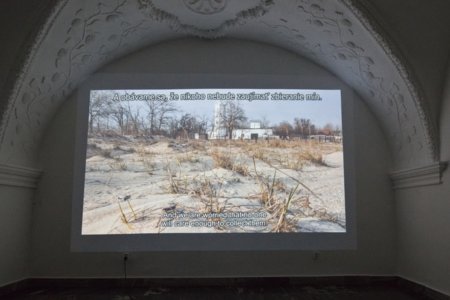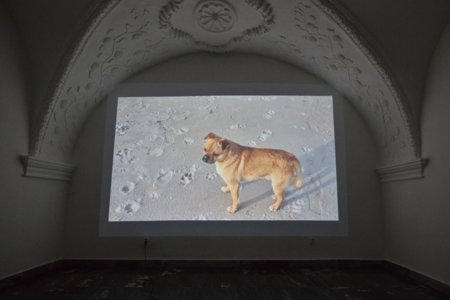Curator: Mária Janušová
Opening: 16/12/2022, 18:00
Duration of the exhibition: 17/12/2022 – 29/10/2023
Venue: Stucco Hall, Jozef Kollár Gallery, Nám. Sv. Trojice 8, Banská Štiavnica
Exhibition partners: Banská Bystrica self-governing region, Chateau Topoľčianky
The exhibition entitled Remember the Smell of Mariupol presents a selection of the short films by Ukrainian artist Zoya Laktionova. We are purposely providing our exhibition space to an artist from our neighbouring country, where war is raging these days. We realize that our mission as an art institution is to serve the needs of contemporary society and not to be just some kind of closed temple of muses. In the meaning of the critical museum theory (Piotr Piotrowski), we want to be an open platform that uses its cultural space and authority in the struggle for social justice and the defence of democracy. The presented exhibition is thus a sign of our support for Ukraine and condemnation of Russian aggression on the innocent lives of its residents.
The exhibition presents four short films documenting the artist's hometown of Mariupol. The videos bring critical perspectives on the problems of the city – environmental, as well as problems caused by the war. In her works, the artist relies on the reflection of memory, recollection, uses individual narratives, local histories, or micro-stories against the backdrop of the current geopolitical situation of Ukraine.
The first video Remember the Smell of Mariupol (2022, 4:33 min.), which is covering the title of the entire exhibition, reflects the current period of the Russian military occupation of Ukraine. The work was created during the artist's foreign exile, where she - like thousands of women, children, and seniors - was forced to flee because of the war. In the video, Laktionova poetically expresses her feelings about the current war situation. The short film does not contain oral narration; the story is presented here through the artistic text. The video consists of various, interweaving shots of the landscape - from Mariupol, from the artist's foreign shelter or an archival landscape created from photographs from her childhood. The artist's notes, written in the first weeks of the war, bring us direct testimony of her personal experience of the horrors of war, which are taking place in her native Mariupol. In the city of Mariupol, the heaviest battles and extensive infrastructure devastation took place. It must be incredibly difficult for the artist as a resident of Mariupol to watch how is her home gradually ruined and how are innocent fellow citizens dying. The Mariupol she knew is slowly disappearing from reality and she is left with only personal memories and glimpses into the past.
The next video – The Territory of Empty Windows (2020, 10:09 min.) tells the stories of the artist's family about life in Mariupol. Her family history relates to the functioning of the Azov steel-mill. This huge factory not only brought jobs and economic stability, but also brought catastrophic environmental problems for residents and the environment. Another blow to the life of the city and its inhabitants was dealt by the Russian occupation of eastern Ukraine, which has lasted since 2014. For almost a decade, the inhabitants have been forced to face the consequences of war, shelling, explosions, and coexistence with soldiers.
Similarly, the video Diorama (2018, 11:30 min.) deals with the transformation of the city – a former holiday paradise into a dangerous explosive zone. The sea is filled with mines that can damage the lives of inhabitants and animals. On the deserted beach, only a few fishermen can be seen, risking their lives to ensure their livelihood. All that remains are memories of a happy past.
The last video Lighthouse (2020, 5:36 min.) is an experimental poetic film without words and text narration. The short black and white video uses a lot of contrasts and offers a deeper symbolic reading. It talks about life, death, hope or wandering. Does Mariupol even have a future after overcoming the painful journey?
Zoya Laktionova (*1984) comes from Mariupol, Ukraine. In her work, she combines documentary filmmaking and contemporary visual art. She mostly deals with the themes of memory, war, and personal stories. https://www.zoyalaktionova.com
Text by: Mária Janušová
Photo by: Beata Babiaková





